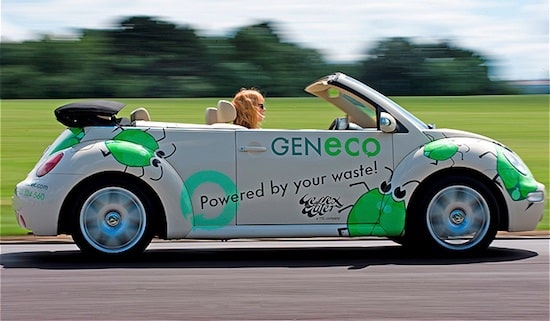
Biomethane-fuelled cars key to net zero transport
Biomethane used as transport fuel delivers better environmental benefits than electric vehicles.
That is the conclusion of a new report that urges to EU to back the biogas industry and equalise support for the two ‘green’ fuels.
The report from the European Biogas Association (EBA), entitled Acknowledging the Full Potential of Biomethane as Transport Fuel, delivers a comparative analysis of 11 studies, with each showing that on every measure biomethane transport fuel results in the same or less emissions than are delivered by electric vehicles.
Over a lifecycle (well-to-wheel rather than tank-to-wheel) analysis biomethane comes out on top – as the mining of rare earth minerals for EV batteries is hugely environmentally damaging.
The report breaks new ground for the industry in that it emphasises the very real viability of biomethane being used in the fleet of ‘family’ cars. Until now biomethane transport fuel has primarily been viewed as a replacement for diesel powered heavy goods vehicles.
That must change, the report says, observing that despite all efforts from the EU greenhouse gas emissions from transport have increased year on year since 2014. “The need for further actions to reduce emissions in the transport sector must be addressed without delay.”
The combustion engine is compatible with biomethane
Biomethane is a readily available solution that will deliver immediate environmental benefits while ensuring the economic benefits remain within the EU.
The report states, “All studies on alternative fuels since 2010, including EU Joint Research Centre reports, show that biomethane can reach even carbon negative levels of CO2 reductions on the transport sector.
“This renewable fuel is readily available, scalable and contributes to maintaining a strong car industry within the EU. It is now crucial to untap the valuable role of biomethane non an equal footing with electric mobility to ensure the much needed decarbonisation of the EU transport sector.”
Aside from the obvious and immediate benefit of decarbonising the transport sector the report emphasises the jobs dividend, across both the biogas and automotive sectors. This is because the existing internal combustion engine can be either retrofitted to run on biomethane or existing factories retooled to deliver biomethane compatible engines.
The report states the production of biomethane compatible cars and HGVs is cleaner than the production of EVs and points out that manufacture would be undertaken in Europe, “reducing the dependency on the import of batteries and rare earth minerals produced in regions with political instability and violated labour rights”.
There are currently 1.4 million gas-fuelled cars within the EU. However, despite the evident benefits the report notes ‘only e-mobility benefits for targeted legislative support’.
To level the playing field between biomethane and e-fuelled cars, the report calls on the EU to:
- Recognise biomethane in the Strategy on Sustainable and Smart Mobility.
- Ensure further biomethane deployment, alongside with e-mobility, in the transport sector, and equally promote both fuels to foster the implementation of green fuels.
- Set targets for biomethane use in transport by 2030.
- Switch from TtW (Tank-to-Wheel) to WtW (Well-to-Wheel) or LCA (Life Cycle Assessment) approach by 2030 in all transport and fuel related legislation to guarantee the accurate and comprehensive quantification of CO2 emissions in the transport sector.
- Recognise biomethane as a non-CO2 contributor, on equal footing as electric mobility, while WtW /LCA approach is not implemented. This could be set in the context of the revised Energy Taxation Directive or Fuel Quality Directive, as well as the Regulation setting CO2 emission performance standards for new passenger cars and for new light commercial vehicles.
- Promote biomethane as green fuel in the Alternative Fuels Infrastructure Directive (AFID).
- Encourage EU car manufacturers to develop and produce the required clean fuel gas engines that will enable the scale-up of biomethane in the transport sector and hence a faster.
Harmen Dekker, Director of the EBA, says, “This paper sheds light on the significant potential of biomethane to reduce emissions in the transport sector, which is currently underestimated. Biomethane is a readily available green fuel produced in Europe. The multiple socio-economic and environmental benefits associated to the deployment of this renewable fuel will directly benefit EU citizens. Biomethane is a no regrets option to decarbonise transport.”
Pictured: The Wessex Water Bio Bug, powered by biomethane.

